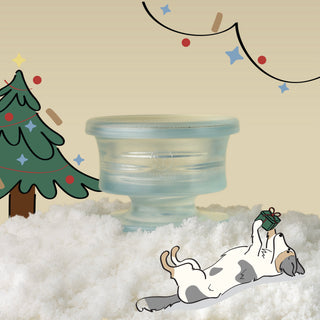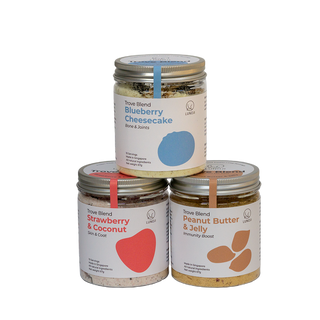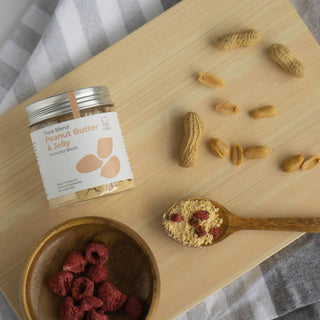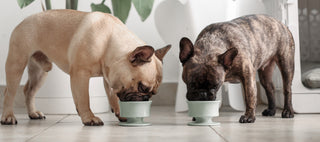Just like humans, animals can experience fear, stress, and anxiety. While a certain level of short-term stress is natural and beneficial for developing resilience, chronic or overwhelming stress is detrimental to your pet’s overall well-being and quality of life.
In an earlier article about calming supplements for pets, we discussed the following:
- What are pet calming supplements?
- Do pet calming supplements work?
- How do I know if my pet needs a calming supplement?
- How do I know if the calming supplement my pet is on is helping?
In this article, let's dive a little deeper into the research on calming ingredients!
Scientific evidence on calming ingredients
When looking at research and studies, it is important to know that compared to human trials, there is a general lack of studies about the effects of calming ingredients on pets. Studies may be performed on the active ingredient of a product instead of the product itself. Some evidence or conclusions are also drawn or extrapolated from studies done on humans or other animals such as mice (instead of cats or dogs). It is up to discerning pet owners to determine whether a product is suitable for their pet.
With that in mind, here is a list of the common functional ingredients found in pet calming supplements, and relevant studies to support their claims:
L-Theanine
What is L-Theanine?
An amino acid naturally found in green tea.
How does L-Theanine work to promote calmness?
L-Theanine increases levels of calming neurotransmitters such as GABA, serotonin, and dopamine, which promote relaxation without sedation.
What studies have been done on L-Theanine and calming effects on pets?
A study in the Journal of Veterinary Behavior found that when combined with behavioral therapy, L-Theanine could be useful in treating noise phobias in dogs.
- This study divided dogs with noise phobias into two groups: one receiving L-Theanine and behavioral therapy, and the other receiving only behavioral therapy.
- While a statistically significant reduction in intensities of phobic symptoms was observed in both groups, only the group receiving L-Theanine showed a decrease in specific stress-related behaviors like drooling and vocalising.
- Citation: Michelazzi, Manuela & Berteselli, Greta & Minero, Michela & Cavallone, Elena. (2010). Effectiveness of L-theanine and behavioral therapy in the treatment of noise phobias in dogs. Journal of Veterinary Behavior-clinical Applications and Research - J VET BEHAV-CLIN APPL RES. 5. 34-35. 10.1016/j.jveb.2009.10.020.
Another study in the Journal of Veterinary Behavior suggests that L-Theanine helps with thunderstorm sensitivity in dogs.
- This study invited participating owners to complete multiple questionnaires about their dog’s stress behaviours before and after treatment with L-Theanine.
- There was a statistically significant decrease in anxiety scores post-treatment. In addition, participants also observed a significant decrease in the time taken for their pets to return to baseline behaviours.
- Citation: Amy L. Pike, Debra F. Horwitz, Heidi Lobprise, An open-label prospective study of the use of l-theanine (Anxitane) in storm-sensitive client-owned dogs. Journal of Veterinary Behavior, Volume 10, Issue 4, 2015, Pages 324-331, ISSN 1558-7878, https://doi.org/10.1016/j.jveb.2015.04.001.
L-Tryptophan
What is L-Tryptophan?
An essential amino acid and a precursor to serotonin.
How does L-Tryptophan work to promote calmness?
Tryptophan is converted into serotonin in the brain, which helps regulate mood, sleep, and anxiety.
What studies have been done on L-Tryptophan and calming effects on pets?
There are limited studies that conclusively show L-Tryptophan as a standalone supplement having a calming effect on pets. However, one study shows that when given a diet containing L-Tryptophan and Lactium (see below), anxious dogs experienced a significant decrease in cortisol level (the stress hormone).
Citation: Maki Kato, Kazuki Miyaji, Nobuyo Ohtani, Mitsuaki Ohta, Effects of prescription diet on dealing with stressful situations and performance of anxiety-related behaviors in privately owned anxious dogs, Journal of Veterinary Behavior, Volume 7, Issue 1, 2012, Pages 21-26, ISSN 1558-7878, https://doi.org/10.1016/j.jveb.2011.05.025.
Lactium® (Casein Hydrolysate / Alpha-Casozepine)
What is Lactium / Casein Hydrolysate / Alpha-Casozepine?
A milk-derived bioactive peptide.
How does Lactium work to promote calmness?
Lactium binds to GABA-A receptors in the brain and increases the activity of gamma-Aminobutyric acid (GABA), a neurotransmitter well known for its inhibitory action on anxiety and its relaxing properties.
What studies have been done on Lactium and calming effects on pets?
A study in the Journal of Veterinary Behavior found that Lactium was effective in treating anxiety in dogs.
- This blind study divided anxious dogs into two groups: one receiving Lactium and the control group receiving Selegiline (marketed in veterinary medicine as a treatment for anxiety disorders).
- The effects of treatment of both compounds were shown to be equally effective, and owners’ evaluations of their dogs’ behaviors improved.
- Citation: Claude Beata, Edith Beaumont-Graff, Christian Diaz, Muriel Marion, Nicolas Massal, Nathalie Marlois, Gérard Muller, Catherine Lefranc, Effects of alpha-casozepine (Zylkene) versus selegiline hydrochloride (Selgian, Anipryl) on anxiety disorders in dogs, Journal of Veterinary Behavior, Volume 2, Issue 5, 2007, Pages 175-183, ISSN 1558-7878, https://doi.org/10.1016/j.jveb.2007.08.001.
Similarly, a study in the Veterinary Medicine and Science Journal suggested that Lactium is effective in reducing stress in cats.
- This study divided cats with FIC (Feline Idiopathic Cystitis, of which stress is a significant contributing factor) into 2 groups, one under theraparutic urinary stress diet with Lactium, and the control group on on a standard commercial diet.
- There was a significant decrease of FIC recurrence episode in the group of cats with Lactium in their diet.
- Citation: Naarden B, Corbee RJ. The effect of a therapeutic urinary stress diet on the short-term recurrence of feline idiopathic cystitis. Vet Med Sci. 2020 Feb;6(1):32-38. doi: 10.1002/vms3.197. Epub 2019 Sep 18. PMID: 31532910; PMCID: PMC7036317.
Other common active ingredients in calming supplements for pets include GABA (gamma-aminobutyric acid), valerian root extract, and chamomile extract. We will be updating this article soon with more details on other ingredients!










